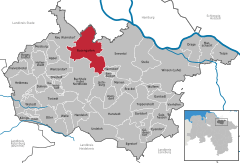Rosengarten, Lower Saxony
From Wikipedia, the free encyclopedia
| Rosengarten | ||
|---|---|---|
| ||
 Rosengarten | ||
Location of Rosengarten within Harburg district 
 | ||
| Coordinates: 53°23′N 09°54′E / 53.383°N 9.900°ECoordinates: 53°23′N 09°54′E / 53.383°N 9.900°E | ||
| Country | Germany | |
| State | Lower Saxony | |
| District | Harburg | |
| Subdivisions | 10 Ortsteile | |
| Government | ||
| • Mayor | Dietmar Stadie (SPD) | |
| Area | ||
| • Total | 63.67 km2 (24.58 sq mi) | |
| Elevation | 85 m (279 ft) | |
| Population (2012-12-31)[1] | ||
| • Total | 12,907 | |
| • Density | 200/km2 (530/sq mi) | |
| Time zone | CET/CEST (UTC+1/+2) | |
| Postal codes | 21224 | |
| Dialling codes | 04108 | |
| Vehicle registration | WL | |
Rosengarten is a rural municipality in the district of Harburg, Lower Saxony, Germany, close to Hamburg. It has a population of 13,242 (2004). It was formed in 1972 as a combination of the villages of Eckel, Ehestorf (with Alvesen), Emsen, Iddensen, Klecken, Leversen, Nenndorf, Sottorf, Tötensen, and Vahrendorf, and was named for a nearby forest of the same name.
Established 1990 the Honorary Consulate of the Republic of Guinea to Hamburg is located in the street Rehwechsel 28. [2]
The village Tötensen is well known in Germany as the residence of Dieter Bohlen.
Notes
- ↑ Landesbetrieb für Statistik und Kommunikationstechnologie Niedersachsen, Fortgeschriebene Einwohnerzahlen zum 31. Dezember 2012
- ↑ List of the Consular corps, the trade missions, cultural institutes and international institutes in the Free and Hanseatic city of Hamburg, Senate of the Free and Hanseatic city of Hamburg, Chancellery of the Senate (April 2008)
External links
- Official homepage (in German)
This article is issued from Wikipedia. The text is available under the Creative Commons Attribution/Share Alike; additional terms may apply for the media files.
